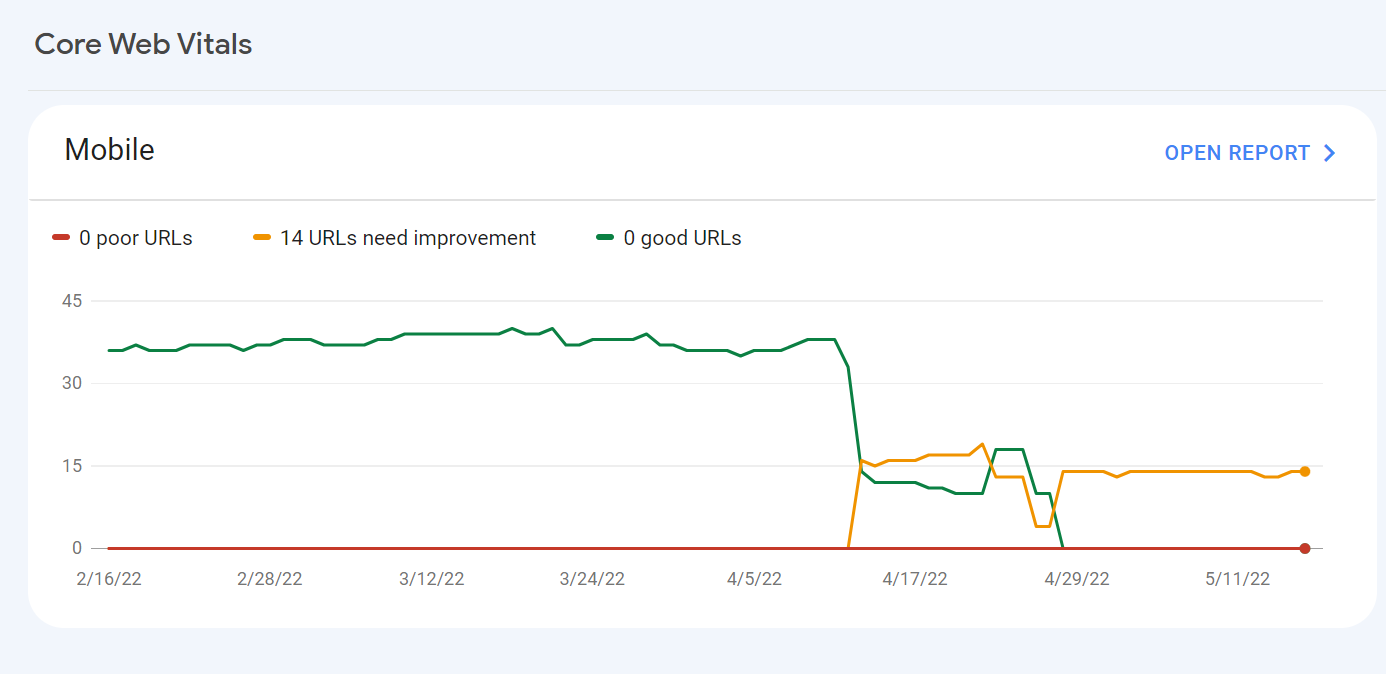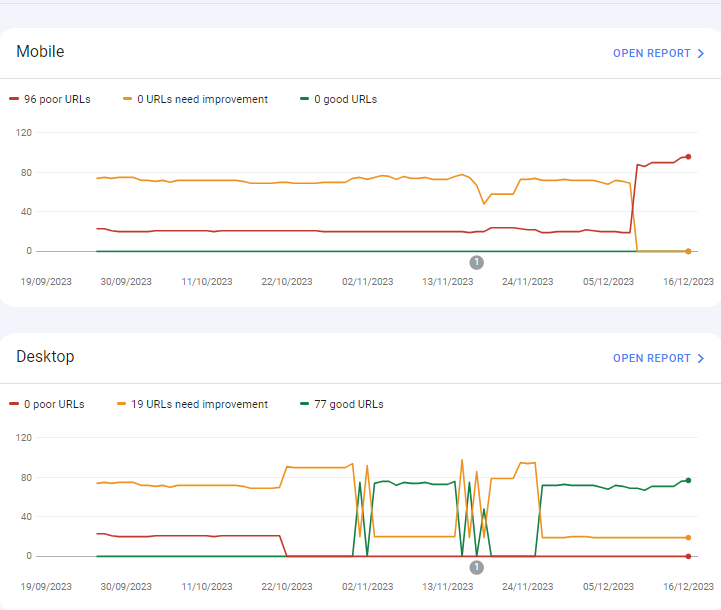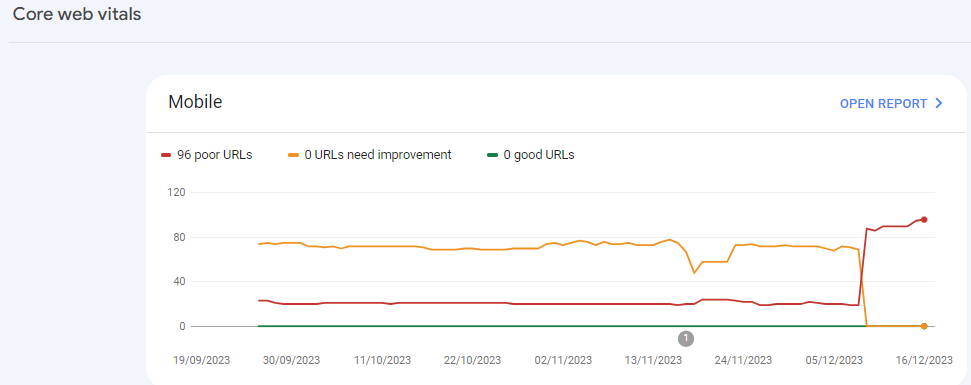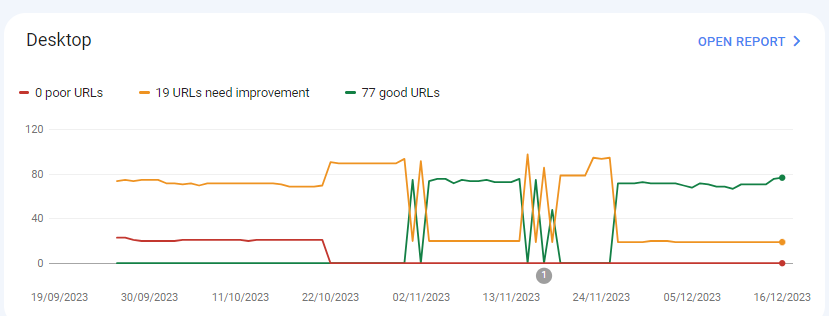Moz Q&A is closed.
After more than 13 years, and tens of thousands of questions, Moz Q&A closed on 12th December 2024. Whilst we’re not completely removing the content - many posts will still be possible to view - we have locked both new posts and new replies. More details here.
Sudden Drop in Mobile Core Web Vitals
-

For some reason, after all URLs being previously classified as Good, our Mobile Web Vitals report suddenly shifted to the above, and it doesn't correspond with any site changes on our end.
Has anyone else experience something similar or have any idea what might have caused such a shift?
Curiously I'm not seeing a drop in session duration, conversion rate etc. for mobile traffic despite the seemingly sudden change.
-
I can’t understand their algorithm for core web vitals. I have made some technical updates to our website for speed optimization, but the thing that happened in the search console is very confusing for my site.

For desktops, pages are indexed as good URLs
while mobile-indexed URLs are displayed as poor URLs.
Our website is the collective material for people looking for Canada immigration (PAIC), and 70% of the portion is filled with text only. We are using webp images for optimization, still it is not passing Core Web Vitals.I am looking forward to the expert’s suggestion to overcome this problem.
-
I can’t understand their algorithm for core web vitals. I have made some technical updates to our website for speed optimization, but the thing that happened in the search console is very confusing for my site.


For desktops, pages are indexed as good URLs
while mobile-indexed URLs are displayed as poor URLs.
Our website is the collective material for people looking for Canadian immigration (PAIC), and 70% of the portion is filled with text only. We are using webp images for optimization, still it is not passing Core Web Vitals.I am looking forward to the expert’s suggestion to overcome this problem.
-
@rwat Hi, did you find a solution?
-
Yes, I am also experiencing the same for one of my websites, but most of them are blog posts and I am using a lot of images without proper optimization, so that could be the reason. but not sure.
It is also quite possible that Google maybe adding some more parameters to their main web critical score.
Got a burning SEO question?
Subscribe to Moz Pro to gain full access to Q&A, answer questions, and ask your own.
Browse Questions
Explore more categories
-
Moz Tools
Chat with the community about the Moz tools.
-
SEO Tactics
Discuss the SEO process with fellow marketers
-
Community
Discuss industry events, jobs, and news!
-
Digital Marketing
Chat about tactics outside of SEO
-
Research & Trends
Dive into research and trends in the search industry.
-
Support
Connect on product support and feature requests.
Related Questions
-
Unsolved Google Search Console Still Reporting Errors After Fixes
Hello, I'm working on a website that was too bloated with content. We deleted many pages and set up redirects to newer pages. We also resolved an unreasonable amount of 400 errors on the site. I also removed several ancient sitemaps that listed content deleted years ago that Google was crawling. According to Moz and Screaming Frog, these errors have been resolved. We've submitted the fixes for validation in GSC, but the validation repeatedly fails. What could be going on here? How can we resolve these error in GSC.
Technical SEO | | tif-swedensky0 -
Need some help understanding SEO - Please help before I lose [pull out] all my hair
I'm new to SEO, and am stubbornly trying to educate myself. I have a telescope shop in Canada, it's a small business that we run on the side. We're driving lots of traffic through FB and our outreach programs but I really want to increase our presence on search. We released a new website back in January and it killed some of our rankings. We're working our way back with a very specific set of efforts on regular SEO: Metadata and titles, although it seems that's not super relevant Building high quality backlinks and eliminating any spammy backlinks Rewriting product listings so that they are original content though I'm not sure how important this is in e-commerce Writing high quality articles and blog posts Working relevant keywords into our product pages and titles I understand that good SEO is about pushing on all the levers, and trying to make sure that your site is as valuable to the end user as possible. We're making some good progress, but I'm puzzled by the #1 shop in Canada. They don't put any apparent effort into SEO and they still rank #1 on every key product we compete with them on. I've worked with two separate, highly ranked and regarded SEO firms on this and neither has been able to tell my why this other site ranks so highly. Here's a specific example on a popular product that we both sell, the Celestron NexStar 8SE. Here’s the link to Telescope Canada’s page for their Celestron 8SE: https://telescopescanada.ca/products/celestron-nexstar-8se-computerized-telescope-11069 Here’s a link to the Celestron 8SE page from the manufacturer website: https://www.celestron.com/products/nexstar-8se-computerized-telescope Telescopes Canada has just copied and pasted. There is no original content aside from adding the shipping and return policy to the tab, and having some options for selecting accessories on the page. Here is our page: https://all-startelescope.com/products/celestron-nexstar-8se We have higher page authority, higher domain authority, and they keyword analyzer in moz says that our page is higher quality than the Telescopes Canada page. I can’t find a single metric on any tool (ubbersuggest, Moz, ahrefs, semrush) that says Telescopes Canada is a better site, or has a better NexStar 8SE product page. But they keep ranking ahead of us, and right at the top of google search. Our titles are good, our metadata is good (but I don’t think that’s been a serious ranking factor for about ten years). Our text is original, it’s relevant, we have healthy internal links to the page. According to Moz's page ranker it's 20 points higher than Telescope Canada's page. We have invensted in some excellent blog content, we’re adding new products to the website so that we rank for more keywords. All of those things are helping, but I fundamentally don’t understand why Telescopes Canada is #1 almost across the board on every key product in our market. There is something that I’m not seeing here. Can you see any metric, any tool in your toolbox that indicates why they rank at the top, or even higher than we do for in these search terms specific to that product: Celestron NexStar 8SE
Intermediate & Advanced SEO | | nkennett
NexStar 8SE
Celestron NexStar 8SE Canada
NexStar 8SE Canada I have a feeling it's something technical that I'm missing, but I'm not sure how obvious it is with two 'professional' firms not finding it. I'd really appreciate any help or insight that you can offer.0 -
Solved How to solve orphan pages on a job board
Working on a website that has a job board, and over 4000 active job ads. All of these ads are listed on a single "job board" page, and don’t obviously all load at the same time. They are not linked to from anywhere else, so all tools are listing all of these job ad pages as orphans. How much of a red flag are these orphan pages? Do sites like Indeed have this same issue? Their job ads are completely dynamic, how are these pages then indexed? We use Google’s Search API to handle any expired jobs, so they are not the issue. It’s the active, but orphaned pages we are looking to solve. The site is hosted on WordPress. What is the best way to solve this issue? Just create a job category page and link to each individual job ad from there? Any simpler and perhaps more obvious solutions? What does the website structure need to be like for the problem to be solved? Would appreciate any advice you can share!
Reporting & Analytics | | Michael_M2 -
Huge drop in rankins, traffic and impressions after changing to CloudFlare
Hi there, In October, one of our customer's programmer made a change on their website to optimize its loading speed. Since then, the all the SEO's metrics has dropped. Apparently, the change was to move to CloudFlare and to add Gzip compression. I was talking with the programmer and he told me he had no idea why that happened. Now comes 5 months later and the SEO metrics havn't come back yet. What seems so wierd is that two keywords in particular had the most massive drop. Those two keywords were the top keywords (more than 1k of impressions a month) and now its like there is no impressions or clics at all. Did anyone had the same event occur to them? Do you have any idea what could help this case?
Technical SEO | | H.M.N.0 -
Why is Google Webmaster Tools showing 404 Page Not Found Errors for web pages that don't have anything to do with my site?
I am currently working on a small site with approx 50 web pages. In the crawl error section in WMT Google has highlighted over 10,000 page not found errors for pages that have nothing to do with my site. Anyone come across this before?
Technical SEO | | Pete40 -
How can I block incoming links from a bad web site ?
Hello all, We got a new client recently who had a warning from Google Webmasters tools for manual soft penalty. I did a lot of search and I found out one particular site that sounds roughly 100k links to one page and has been potentialy a high risk site. I wish to block those links from coming in to my site but their webmaster is nowhere to be seen and I do not want to use the disavow tool. Is there a way I can use code to our htaccess file or any other method? Would appreciate anyone's immediate response. Kind Regards
Technical SEO | | artdivision0 -
Google rankings dropped dramatically after 24 hrs of hosting suspension
Hi, One of my websites ( http://www.traveldestinationsearch.com/ ) dropped most of its Google rankings after 24 hours of hosting suspension (from April 26 until April 27, 2012). The hosting company suspended my website after exceeding the bandwidth limit: there was no unusual activity on my website, it just exceeded its bandwidth limit by 20-30MB for the previous month. Anyway, the website is back online since April 27 but the problem is that, following these 24 hrs of no service, I see a dramatic decrease of my website's Google rankings for its main keywords. Even today, April 29, I can't find my website anywhere in the first 100 results for most of its targeted keywords. Before the suspension, the website ranked #1 for its main keyword and somewhere in the first 2-3 pages of Google search results for other two main keywords. My question is: is it the hosting suspension the reason for the Google ranking drop, and (assuming this is a temporary problem) when do you think I should expect my website to regain the rankings it had before the hosting suspension? Thanks for your support. Regards, Adrian
Technical SEO | | AdrianBanu0 -
Drop Down Menu - Link Juice Depletion
Hi, We have a site with 7 top level sections all of which contain a large number of subsections which may then contain further sub sections. To try and ensure the best user experience we have a top navigation with the 7 top level sections and when hovered a selection of the key sub sections. Although I like this format for the user as it makes it easier for them to find the most important sections / sub sections it does lead to a lot of links within every page on the site. In general each top section has a drop down with approx 10 - 15 subsections. This has therefore lead to SeoMoz's tools issuing its too many internal links warning. Then alongside this I am left wondering if I shouldn’t have to many links to my subsections and whether I would be better off being more selective of when I link to them. For instance I could choose the top 5 sub sections and place a link to them from our homepage and by doing so I would be passing a greater amount of link juice down the line. So I guess my dilemma is between ensuring the user has as easy a time traversing the site as possible whilst I try to keep a close watch on where, and how, our link juice is distributed. One solution I am considering is whether no-follow links could be utilised within the drop down menus? This way I could then have the desired user navigation and I would be in greater control of what pages link to which sub sections. Would that even work? Any advice would be greatly appreciated, Regards, Guy
Technical SEO | | guycampbell1